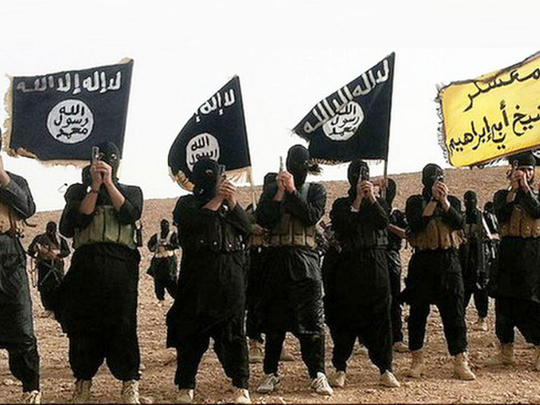
Daesh’s so-called caliphate stretching across large swathes of Iraq and Syria is close to being completely dismantled and is likely to represent nothing other than one of history’s fleeting oddities.
The Syrian oil-and-gas-rich province of Deir Al Zor has been liberated by Syrian forces while Kurdish and Arab fighters are advancing on the terrorist group’s last bastion Al Bu Kamal. Iraq, where Daesh (the self-proclaimed Islamic State of Iraq and the Levant) was spawned, is on the point of being officially declared Daesh-free. These hard-won victories are certainly a cause for celebration.
However, Syria remains overrun with armed groups of similar stripes, including Al Qaida and Hayat Tahrir Al Sham that includes its former affiliate — the rebranded Jabhat Al Nusra. There is still a long road ahead before Syrians can enjoy peace and stability. Likewise, unless the Iraqi government is able to negotiate a settlement with Kurdish separatists and sees the wisdom in treating Iraq’s Sunni population fairly, the spectre of civil war or new terror groups emerging will continue to cast its shadow over that country.
The fact that Daesh has been deprived of territory may be good news for the long besieged neighbours, but the displacement of fighters presents a new set of challenges for other countries. Substantial numbers have been killed by air strikes or during street-to-street battles, but untold numbers remain active. Indeed, a deal was brokered permitting non-Daesh extremists to leave the group’s former de facto capital Raqqa on buses to preserve innocent lives. Since fighters are not branded on their foreheads, no doubt Daesh took advantage of that route out. Many others flocked out of Mosul when defeat seemed certain. Where have they gone?
Whereas nationals who joined Daesh have tended to blend into the society, biding their time until they are able to regroup, battle-hardened foreign terrorists have either gravitated to bases in Libya, elsewhere in Africa, Yemen or Afghanistan.
In many cases, they have returned to their home countries tasked with recruiting new blood or supervising deadly mayhem in the knowledge that they risk arrest or, at best, close monitoring by intelligence services. A minority arrives armed with a sob story of how they were deceived or tricked. The genuinely disillusioned eager to be given another chance are insignificant. The clever ones succeed in going under the radar; after all, the majority’s passports remain free of Syrian or Iraqi entry stamps. An appearance make-over and a tall tale is often all they require.
In short, the threat from Daesh is no longer “somewhere over there”, but is amplified in countries where humanity’s dregs are plotting within and on cyberspace.
Countries handle known terrorist returnees in different ways; usually arrest, prosecution and substantial jail time; occasionally the death penalty. There is a debate raging in Europe whether to bring back the death sentence with respect to convicted terrorists.
Rehabilitation programme
That said, Sweden and the United Kingdom are going for coddling, yes coddling evil would-be killers. The Swedish city of Lund has come up with a rehabilitation programme designed for former Daesh fighters and others that includes financial support, accommodation, educational opportunities and jobs. Last year, Sweden declared the flying of a Daesh flag was legal.
A 2015 probe into Daesh’s funding shed light on the disgrace that more than 100 French Daesh members were receiving welfare payments, altogether totalling more than €2 million (Dh8.52 million). Belgium’s social welfare system has also been exploited by Daesh’s minions plotting attacks.
A report in the Mail on Sunday almost made me choke on my coffee. To date, more than 425 Daesh terrorists have returned to Britain and, under a proposal being studied by the government, could be offered counselling along with welfare, council housing and assistance with finding employment.
In other words, they may be rewarded for their crimes in a country where more than 4,000 people, including minors, sleep rough on any one night. That together with the British Home Office’s invitation to Muslim Brotherhood leaders to apply for asylum appears to suggest that the UK believes keeping the enemy sweet will keep Britain safe. It will not.
Appeasement is not the answer as Neville Chamberlain discovered to his cost when he signed over part of Czechoslovakia to Nazi Germany before Hitler proceeded to invade Poland. Those enthused by a will to power and a lust for blood cannot be bought with a handful of candies. They are a curse on our planet and should be treated as such.
Linda S. Heard is an award-winning British political columnist and guest television commentator with a focus on the Middle East.








